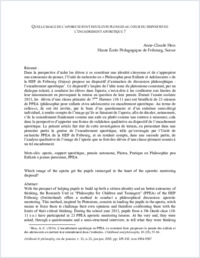Which image of the aporia get the pupils immerged in the heart of the aporetic mentoring disposal?
HEP|PH FR
- Hess, Anne-Claude HEP Fribourg / PH Freiburg
-
2015
Published in:
- Childhood and philosophy. - 2015, vol. 11, no. 21, p. 105-138
aporie
support aporétique
pensée autonome
Platon
pratique de la philosophie pour enfants et adolescents
PPEA
aporia
aporetic support
thinking autonomously
Plato
practice in philosophy for children and young people
PPEA
English
French
With the prospect of helping pupils to build up both a citizen identity and a better autonomy of thinking, the Research Unit in “Philosophy for Children and Teenagers” (PPEA) of the HEP Fribourg (Switzerland) offers a method to conduct a philosophical discussion: aporetic mentoring. This method, inspired by Platonism, consists in leading the pupils in the aporia, which means to force them to challenge their own opinions and therefore confronting them with the limits of their critical thinking. During the school year 2013, pupils from a 5th Grade class (10- 11 y.o.) have participated in 23 PPEA aporetic mentoring lessons. At the very end, they were asked, through a questionnaire and a semi-structured interview, to tell what they were thinking about the aporia; the purpose was to see if they would ultimately consider the aporia as an help or an obstacle to critical thinking and use the results to qualitatively validate the method of aporetic mentoring. This article describes the previously mentioned Field Investigation, by presenting, in a first part, the genesis of aporetic mentoring as is it described by the PPEA Research Unit from the HEP Fribourg and by reporting, in a second part, the results of the qualitative analysis of the aporia done by the pupils who were subject to aporetic mentoring.
Dans la perspective d’aider les élèves à se constituer une identité citoyenne et de s’approprier une autonomie de penser, l’Unité de recherche en « Philosophie pour Enfants et Adolescents » de la HEP de Fribourg (Suisse) propose un dispositif d’animation de discussion philosophique : l’encadrement aporétique. Ce dispositif s’inspire de l’idée issue du platonisme consistant, par un dialogue éclairé, à conduire les élèves dans l'aporie, c'est-à-dire à les confronter aux limites de leur raisonnement en provoquant la remise en question de leur pensée. Durant l’année scolaire 2013, les élèves d’une classe primaire de 7ème Harmos (10-11 ans) ont bénéficié de 23 séances de PPEA (philosophie pour enfants et/ou adolescents) en encadrement aporétique. Au terme de celles-ci, ils ont été invités, par le biais d’un questionnaire et d’un entretien semi-dirigé individuel, à rendre compte de l’image qu’ils se faisaient de l’aporie, afin de déceler, notamment, s’ils la considéraient finalement comme une aide ou plutôt comme une entrave à raisonner, cela dans la perspective d’apporter une forme de validation qualitative au dispositif de l’encadrement aporétique. Le présent article fait état de cette investigation de terrain, en présentant dans une première partie la genèse de l’encadrement aporétique, telle qu’envisagée par l’Unité de recherche PPEA de la HEP de Fribourg, et en rendant compte, dans une seconde partie, de l’analyse qualitative de l’image de l’aporie que se font des élèves d’une classe primaire soumis à un tel encadrement.
- Faculty
- HEP|PH FR
- Language
-
- French
- Classification
- Education, teaching
- License
-
License undefined
- Identifiers
-
- RERO DOC 255966
- Persistent URL
- https://folia.unifr.ch/unifr/documents/312521
Statistics
Document views: 148
File downloads:
- Texte intégral: 156
